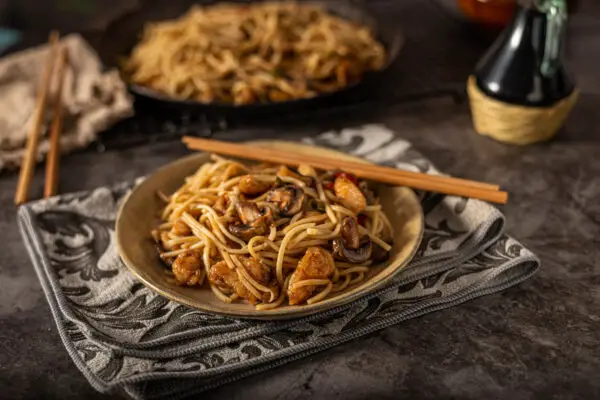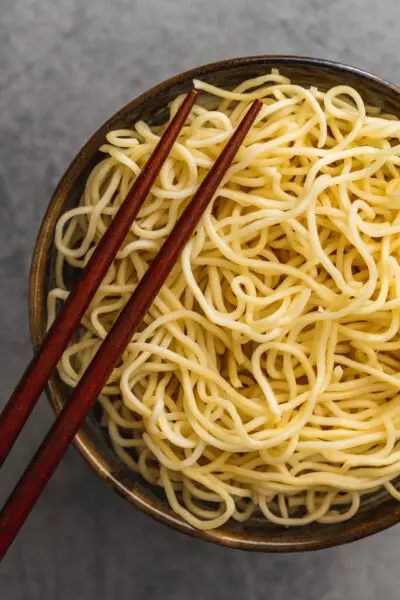In this article, we will discuss the common question of whether or not you can freeze noodles after they are cooked. We will explore the factors to consider when freezing cooked noodles and provide some helpful tips to ensure the best results.
By the end of this article, you will have a clear understanding of whether freezing cooked noodles is a viable option and how to do it properly.
Is it Safe to Freeze Noodles After They Have Been Cooked?
Yes, it’s safe to freeze cooked noodles. Follow freezing cooked pasta instructions to properly store them. Cool the noodles, then transfer to airtight containers or freezer bags. Label with the date and freeze for up to three months. Thaw in the refrigerator before reheating. Enjoy your convenient pasta whenever you like!
Can You Freeze Noodles After They Are Cooked
Are you wondering if it’s possible to freeze noodles after they have been cooked? The answer is yes, you can freeze cooked noodles! Freezing cooked noodles is a convenient way to have them on hand for quick and easy meals in the future.

Whether you have leftover noodles from a big batch or want to meal prep for the week ahead, freezing cooked noodles can be a lifesaver. In this article, we will explore the benefits and factors to consider before freezing cooked noodles, as well as proper preparation methods and tips for thawing and reheating. So let’s dive in!
Why You Might Want to Freeze Cooked Noodles
There are several reasons why you might want to freeze cooked noodles. Perhaps you made a large portion of noodles and have leftovers that you don’t want to go to waste. Freezing them will allow you to enjoy these noodles at a later time.
Additionally, if you have a busy schedule or prefer meal prepping, freezing cooked noodles can save you time and effort in the kitchen. By cooking a larger batch and freezing individual portions, you can easily whip up a meal whenever you desire with minimal preparation required.
Benefits of Freezing Cooked Noodles
Freezing cooked noodles offers various benefits. First and foremost, it helps to prevent food waste. Instead of letting your leftover noodles spoil, you can store them in the freezer for future use. This not only saves money but also reduces your environmental footprint.
Additionally, freezing cooked noodles can be a time-saver. You can cook a batch of noodles in advance and freeze them in serving-sized portions. When you’re ready to eat, simply thaw and reheat, and you’ll have a delicious meal ready in no time.
Factors to Consider Before Freezing Cooked Noodles
Before you freeze your cooked noodles, there are a few factors to consider. The type of noodles you are working with is essential.
While most types of noodles freeze well, some may not retain their texture and flavor as effectively. Thin noodles, such as spaghetti or angel hair, tend to freeze better than thicker ones, like fettuccine or lasagna.
Additionally, noodles that are already sauced or mixed with other ingredients may not freeze as well since the sauce or ingredients could affect the texture upon thawing.
It’s important to take these factors into account when deciding whether to freeze your cooked noodles.
Proper Preparation for Freezing Cooked Noodles
To ensure your cooked noodles freeze well and maintain their quality, proper preparation is key. Start by cooking the noodles according to the package instructions until they are al dente.
Overcooking the noodles may result in a mushy texture when thawed.
Once cooked, drain the noodles thoroughly and rinse them with cold water to stop the cooking process.
After rinsing, toss the noodles with a small amount of oil to prevent them from sticking together. This step is especially important for long, thin noodles like spaghetti.
Methods for Freezing Cooked Noodles
There are a few different methods you can choose from when it comes to freezing your cooked noodles. One popular method is to freeze them in individual portions.
Portion out the cooked noodles into freezer-safe containers or resealable bags, ensuring that they are tightly sealed to prevent freezer burn.
Another option is to lay the noodles flat on a baking sheet lined with parchment paper and freeze them until solid. Once frozen, transfer the noodles into a container or bag for long-term storage.
Both methods work well, so choose the one that suits your storage space and preference.
Tips for Freezing Cooked Noodles
To ensure the best possible results when freezing cooked noodles, here are a few additional tips to keep in mind:
- Label and date your containers or bags, so you can easily track when they were frozen.
- Avoid overcrowding the containers or bags to prevent the noodles from sticking together.
- If you decide to use resealable bags, try to remove as much air as possible before sealing to prevent freezer burn.
- Consider freezing the noodles in individual portions, so you can easily thaw and use only what you need.
Thawing and Reheating Frozen Cooked Noodles
When you’re ready to enjoy your frozen cooked noodles, it’s important to thaw and reheat them properly. The safest way to thaw noodles is by transferring them from the freezer to the refrigerator and allowing them to thaw overnight.
This slow thawing method helps to preserve the texture and flavor of the noodles. Alternatively, you can thaw the noodles in the microwave, using the defrost setting in short intervals. Once thawed, it’s time to reheat the noodles.
You can do this by quickly tossing them in a hot pan with a little oil or butter, or by placing them in a microwave-safe dish and reheating in the microwave. Be sure to stir the noodles occasionally during reheating to ensure even heat distribution.
Safety Considerations When Freezing Cooked Noodles
While freezing cooked noodles is generally safe, it’s important to adhere to proper food safety guidelines. Make sure that the noodles are cooled down to room temperature before transferring them to the freezer. Rapidly cooling down hot food prevents the growth of bacteria.
Additionally, it’s recommended to consume the frozen cooked noodles within three months for the best quality. After this period, the noodles may start to lose their texture and flavor.
Alternative Uses for Frozen Cooked Noodles
Aside from reheating your frozen cooked noodles as a main dish, there are several alternative uses for them.
You can add them to soups, stir-fries, or casseroles for an easy and flavorful addition. Frozen noodles can also be used as a base for a cold pasta salad, mixed with fresh vegetables and dressing.
Get creative and experiment with different recipes to find exciting ways to incorporate your frozen cooked noodles.

Conclusion
In conclusion, freezing cooked noodles is a practical way to prevent food waste and save time in the kitchen. By following proper preparation methods and considering factors such as noodle type and ingredients, you can successfully freeze your cooked noodles for future use.
Whether you’re dealing with leftovers or meal prepping, freezing cooked noodles allow you to have a delicious and convenient meal at your fingertips whenever you need it.
So next time you find yourself with extra cooked noodles, don’t hesitate to freeze them and enjoy their goodness later on!

